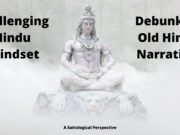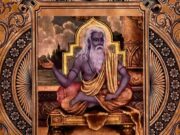That Aryan invasion theory never happened has been established through facts. Then why the use of the word Indo-Aryan is still prevalent in Universities across the world?
Let’s analyze the word Indo-Aryan.
The Aryan invasion theory is still being peddled by the western academics and social demographic engineers.
The social demographic engineers have a vested motive in doing it. Many words are used Indo-Aryan, Indo-Europeans and so on. The word Arya means a Hindu person. The word Arya cannot be used for anyone who doesn’t follow Vedic scriptures. In a way, if anyone claims to be an Aryan has to be a follower of Sanatana Dharma or Hinduism. When was the Aryan invasion theory propounded? Indo-European theory was propounded after the 1857 mutiny of Hindu sepoys against East India Company. Late 1800s was the first usage of this term by the British Christian missionaries based on funding of British Royal Government. The idea was to weaken the identity of Hindus so that the British could rule over them.
It was widely recognized that Hindus were culturally and philosophically better than all Abrahamic faiths put together.
Max Mueller, Macaulay’s work was used to demean the history, culture, language and scientific achievement of Hindus or followers of Sanatana Dharma. That was the beginning of the epithet Indo-European, Indo-Aryan etc etc. It is a widely acknowledged fact through archeological findings that the entire Europe was once under a large Vedic empire just 5000 years back. The Abhiras or Arabs were the closest to India and they used Vedic scientific achievements to educate Europeans. It is also an established fact that Hindus or Sanatanis were experts in chariot-based warfare and horse-based warfare skills. In addition they were very well trained in hand-to-hand martial combat. Martial races of Hindus were known to never run away from battle. British Christian missionaries knew that until they confuse the Hindus through education based propaganda, they won’t be able to rule Hindus.
As far as Muslim invaders are concerned, they were never able to rule Hindus with peace. They were always scared to even move out of their captured forts. So much for their false glorification in Indian text books.
Alexander, the mouse, is a testimony to the fact that how much he was scared of Porus. The whole Greek narrative of History of conquests of Alexander is doubtful and would be regarded as fake news today. Alexander was defeated by Porus and had to run back to save his life. Another myth has been regularly busted by all documented history accounts often ignored by fake news peddlers amongst Western Academicians. One of the major reasons why western academicians have maintained their obstinacy is that they have never been challenged. They have never debated with Indian historians. Also their money and political clout have protected them for long. Once an Indian university bends over backwards to get their approval, the Indian university loses all intellectual and academic independence.
To Summarize, Hindus or followers of Sanatana Dharma are the original Arya. Everyone else is trying to find their own legitimacy through usurping legacy of Hindus.
The aryan invasion theory, Indo- epithets are just another western fake history imposition on Indian minds. It’s time to challenge them through the Indian university framework. When will that happen, only Krishna Bhagavan can tell. What do you think?
Disclaimer: The views expressed are personal to the author
Please donate to support our Hindu online temple















